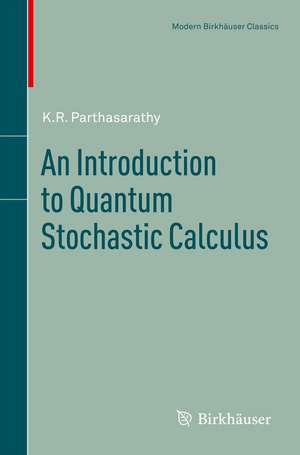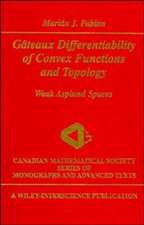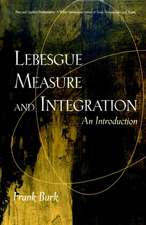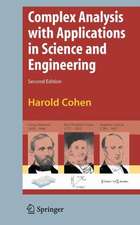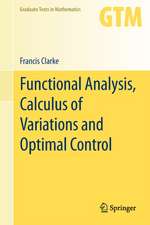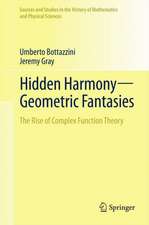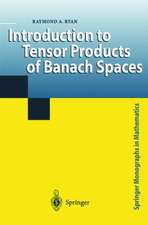An Introduction to Quantum Stochastic Calculus: Modern Birkhäuser Classics
Autor K.R. Parthasarathyen Limba Engleză Paperback – 14 dec 2012
The origin of Ito’s correction formulae for Brownian motion and the Poisson process can be traced to commutation relations or, equivalently, the uncertainty principle.
Quantum stochastic integration enables the possibility of seeing new relationships between fermion and boson fields.
Many quantum dynamical semigroups as well as classical Markov semigroups are realised through unitary operator evolutions.
The text is almost self-contained and requires only an elementary knowledge of operator theory and probability theory at the graduate level.
- - -
This is an excellent volume which will be a valuable companion both to those who are already active in the field and those who are new to it. Furthermore there are a large number of stimulating exercises scattered through the text which will be invaluable to students.
(Mathematical Reviews)
This monograph gives a systematic and self-contained introduction to the Fock space quantum stochastic calculus in its basic form (...) by making emphasis on the mathematical aspects of quantum formalism and its connections with classical probability and by extensive presentation of carefully selected functional analytic material. This makes the book very convenient for a reader with the probability-theoretic orientation, wishing to make acquaintance with wonders of the noncommutative probability, and, more specifcally, for a mathematics student studying this field.
(Zentralblatt MATH)
Elegantly written, withobvious appreciation for fine points of higher mathematics (...) most notable is [the] author's effort to weave classical probability theory into [a] quantum framework.
(The American Mathematical Monthly)
| Toate formatele și edițiile | Preț | Express |
|---|---|---|
| Paperback (2) | 640.71 lei 43-57 zile | |
| Springer – 14 dec 2012 | 640.71 lei 43-57 zile | |
| Birkhäuser Basel – 28 sep 2012 | 644.63 lei 43-57 zile |
Din seria Modern Birkhäuser Classics
-
 Preț: 385.76 lei
Preț: 385.76 lei - 15%
 Preț: 468.12 lei
Preț: 468.12 lei -
 Preț: 477.65 lei
Preț: 477.65 lei - 15%
 Preț: 579.52 lei
Preț: 579.52 lei -
 Preț: 394.87 lei
Preț: 394.87 lei - 15%
 Preț: 469.09 lei
Preț: 469.09 lei - 20%
 Preț: 298.64 lei
Preț: 298.64 lei - 18%
 Preț: 747.20 lei
Preț: 747.20 lei - 15%
 Preț: 691.59 lei
Preț: 691.59 lei -
 Preț: 489.87 lei
Preț: 489.87 lei - 18%
 Preț: 785.11 lei
Preț: 785.11 lei -
 Preț: 390.08 lei
Preț: 390.08 lei - 15%
 Preț: 471.53 lei
Preț: 471.53 lei -
 Preț: 479.67 lei
Preț: 479.67 lei - 15%
 Preț: 534.17 lei
Preț: 534.17 lei - 15%
 Preț: 701.72 lei
Preț: 701.72 lei - 18%
 Preț: 792.34 lei
Preț: 792.34 lei - 15%
 Preț: 581.98 lei
Preț: 581.98 lei - 15%
 Preț: 639.41 lei
Preț: 639.41 lei - 15%
 Preț: 468.90 lei
Preț: 468.90 lei -
 Preț: 385.08 lei
Preț: 385.08 lei - 15%
 Preț: 540.89 lei
Preț: 540.89 lei - 18%
 Preț: 796.13 lei
Preț: 796.13 lei - 18%
 Preț: 904.60 lei
Preț: 904.60 lei - 15%
 Preț: 536.63 lei
Preț: 536.63 lei -
 Preț: 383.33 lei
Preț: 383.33 lei -
 Preț: 384.31 lei
Preț: 384.31 lei - 15%
 Preț: 694.87 lei
Preț: 694.87 lei - 15%
 Preț: 499.43 lei
Preț: 499.43 lei -
 Preț: 419.21 lei
Preț: 419.21 lei -
 Preț: 399.29 lei
Preț: 399.29 lei - 15%
 Preț: 583.61 lei
Preț: 583.61 lei - 15%
 Preț: 643.34 lei
Preț: 643.34 lei - 18%
 Preț: 732.70 lei
Preț: 732.70 lei -
 Preț: 508.54 lei
Preț: 508.54 lei -
 Preț: 394.51 lei
Preț: 394.51 lei -
 Preț: 458.19 lei
Preț: 458.19 lei -
 Preț: 386.39 lei
Preț: 386.39 lei - 15%
 Preț: 588.69 lei
Preț: 588.69 lei -
 Preț: 391.61 lei
Preț: 391.61 lei - 15%
 Preț: 578.24 lei
Preț: 578.24 lei - 15%
 Preț: 583.45 lei
Preț: 583.45 lei - 15%
 Preț: 501.06 lei
Preț: 501.06 lei - 20%
 Preț: 384.03 lei
Preț: 384.03 lei - 15%
 Preț: 594.89 lei
Preț: 594.89 lei -
 Preț: 453.60 lei
Preț: 453.60 lei - 18%
 Preț: 796.45 lei
Preț: 796.45 lei - 15%
 Preț: 694.55 lei
Preț: 694.55 lei - 15%
 Preț: 523.22 lei
Preț: 523.22 lei
Preț: 640.71 lei
Preț vechi: 753.77 lei
-15% Nou
Puncte Express: 961
Preț estimativ în valută:
122.63€ • 126.38$ • 103.53£
122.63€ • 126.38$ • 103.53£
Carte tipărită la comandă
Livrare economică 03-17 martie
Preluare comenzi: 021 569.72.76
Specificații
ISBN-13: 9783034805650
ISBN-10: 3034805659
Pagini: 304
Ilustrații: XI, 290 p.
Dimensiuni: 155 x 235 x 16 mm
Greutate: 0.43 kg
Ediția:1992
Editura: Springer
Colecția Birkhäuser
Seria Modern Birkhäuser Classics
Locul publicării:Basel, Switzerland
ISBN-10: 3034805659
Pagini: 304
Ilustrații: XI, 290 p.
Dimensiuni: 155 x 235 x 16 mm
Greutate: 0.43 kg
Ediția:1992
Editura: Springer
Colecția Birkhäuser
Seria Modern Birkhäuser Classics
Locul publicării:Basel, Switzerland
Public țintă
ResearchCuprins
Preface.- I Events, Observables and States.- II Observables and States in Tensor Products of Hilbert Spaces.- III Stochastic Integration and Quantum Ito’s Formula.- References.- Index.- Author Index.
Notă biografică
Kalyanapuram Rangachari Parthasarathy was professor of statistics at the University of Manchester (1968-70), the University of Bombay (1970-76) and the Indian Statistical Institute Delhi Centre (1977-96) where he was also CV Raman Professor of INSA (1996-2001). Now he is Emeritus Scientist at the Indian Statistical Institute in New Delhi.
Textul de pe ultima copertă
An Introduction to Quantum Stochastic Calculus aims to deepen our understanding of the dynamics of systems subject to the laws of chance both from the classical and the quantum points of view and stimulate further research in their unification. This is probably the first systematic attempt to weave classical probability theory into the quantum framework and provides a wealth of interesting features:
The origin of Ito’s correction formulae for Brownian motion and the Poisson process can be traced to commutation relations or, equivalently, the uncertainty principle.
Quantum stochastic integration enables the possibility of seeing new relationships between fermion and boson fields.
Many quantum dynamical semigroups as well as classical Markov semigroups are realised through unitary operator evolutions.
The text is almost self-contained and requires only an elementary knowledge of operator theory and probability theory at the graduate level.
- - -
This is an excellent volume which will be a valuable companion both for those who are already active in the field and those who are new to it. Furthermore there are a large number of stimulating exercises scattered through the text which will be invaluable to students.
(Mathematical Reviews)
This monograph gives a systematic and self-contained introduction to the Fock space quantum stochastic calculus in its basic form (...) by making emphasis on the mathematical aspects of quantum formalism and its connections with classical probability and by extensive presentation of carefully selected functionalanalytic material. This makes the book very convenient for a reader with the probability-theoretic orientation, wishing to make acquaintance with wonders of the noncommutative probability, and, more specifcally, for a mathematics student studying this field.
(Zentralblatt MATH)
Elegantly written, withobvious appreciation for fine points of higher mathematics (...) most notable is [the] author's effort to weave classical probability theory into [a] quantum framework.
(The American Mathematical Monthly)
The origin of Ito’s correction formulae for Brownian motion and the Poisson process can be traced to commutation relations or, equivalently, the uncertainty principle.
Quantum stochastic integration enables the possibility of seeing new relationships between fermion and boson fields.
Many quantum dynamical semigroups as well as classical Markov semigroups are realised through unitary operator evolutions.
The text is almost self-contained and requires only an elementary knowledge of operator theory and probability theory at the graduate level.
- - -
This is an excellent volume which will be a valuable companion both for those who are already active in the field and those who are new to it. Furthermore there are a large number of stimulating exercises scattered through the text which will be invaluable to students.
(Mathematical Reviews)
This monograph gives a systematic and self-contained introduction to the Fock space quantum stochastic calculus in its basic form (...) by making emphasis on the mathematical aspects of quantum formalism and its connections with classical probability and by extensive presentation of carefully selected functionalanalytic material. This makes the book very convenient for a reader with the probability-theoretic orientation, wishing to make acquaintance with wonders of the noncommutative probability, and, more specifcally, for a mathematics student studying this field.
(Zentralblatt MATH)
Elegantly written, withobvious appreciation for fine points of higher mathematics (...) most notable is [the] author's effort to weave classical probability theory into [a] quantum framework.
(The American Mathematical Monthly)
Caracteristici
One of the first systematic attempts to weave classical probability theory into the quantum framework Self-contained introduction to the Fock space quantum stochastic calculus in its basic form A large number of stimulating exercises make the text invaluable to students? Includes supplementary material: sn.pub/extras
Recenzii
"Elegantly written, with obvious appreciation for fine points of higher mathematics...most notable is [the] author's effort to weave classical probability theory into [a] quantum framework." --The American Mathematical Monthly
"This is an excellent volume which will be a valuable companion both for those who are already active in the field and those who are new to it. Furthermore there are a large number of stimulating exercises scattered through the text which will be invaluable to students." --Mathematical Reviews
"This is an excellent volume which will be a valuable companion both for those who are already active in the field and those who are new to it. Furthermore there are a large number of stimulating exercises scattered through the text which will be invaluable to students." --Mathematical Reviews
